how has presidential power changed over time
/https://tf-cmsv2-smithsonianmag-media.s3.amazonaws.com/filer/Presidency-Power-JFK-with-Robert-631.jpg)
Fifty Januaries ago, under a pallid sunday and amidst bitter winds, John F. Kennedy swore the oath that every president had taken since 1789 and so delivered ane of the about memorable inaugural addresses in the American canon. "We observe today non a victory of party only a celebration of freedom," the 35th president began. Later noting that "the world is very dissimilar at present" from the globe of the Framers because "homo holds in his mortal hands the ability to abolish all forms of man poverty and all forms of human being life," he announced that "the torch has been passed to a new generation of Americans" and made the pledge that has echoed ever since: "Allow every nation know, whether information technology wishes u.s.a. well or ill, that nosotros shall pay any price, bear any burden, meet whatever hardship, support whatever friend, oppose any foe to assure the survival and success of liberty."
Subsequently discoursing on the challenges of eradicating hunger and disease and the necessity of global cooperation in the cause of peace, he declared that "[i]n the long history of the globe, only a few generations have been granted the role of defending freedom in its hour of maximum danger." And so he issued the call for which he is all-time remembered: "And and then, my fellows Americans, ask not what your land can do for you lot, inquire what y'all can do for your country."
The address was immediately recognized equally ex-ceptionally eloquent—"a rallying cry" (the Chicago Tribune), "a oral communication of rededication" (the Philadelphia Bulletin), "a telephone call to activity which Americans have needed to hear for many a year" (the Denver Post)—and acutely attuned to a moment that promised both advances in American prowess and grave peril from Soviet expansion. As James Reston wrote in his column for the New York Times, "The problems before the Kennedy Administration on Inauguration 24-hour interval are much more difficult than the nation has yet come to believe."
In meeting the challenges of his fourth dimension, Kennedy sharply expanded the power of the presidency, peculiarly in foreign diplomacy. The 50th ceremony of his inauguration highlights the consequences—for him, for his successors and for the American people.
To be sure, the President's control over foreign affairs had been growing since the Theodore Roosevelt administration (and nevertheless grows today). TR'southward conquering of the Panama Culvert Zone preceded Woodrow Wilson'southward decision to enter World War I, which was a prelude to Franklin Delano Roosevelt's management of the run-up to the victorious American try in World War II. In the 1950s, Harry Southward. Truman's response to the Soviet threat included the decision to fight in Korea without a Congressional declaration of war, and Dwight Eisenhower used the Central Intelligence Agency and brinksmanship to contain Communism. Nineteenth-century presidents had had to contend with Congressional influences in strange affairs, and specially with the Senate Foreign Relations Commission. Just by the early 1960s, the president had become the undisputed architect of U.Due south. foreign policy.
One reason for this was the emergence of the U.s.a. equally a great power with global obligations. Neither Wilson nor FDR could accept imagined taking the country to war without a Congressional declaration, but the exigencies of the common cold war in the 1950s heightened the country's reliance on the president to defend its interests. Truman could enter the Korean conflict without having to seek Congressional approving simply by describing the deployment of U.S. troops as a law action taken in conjunction with the Un.
But Truman would learn a paradoxical, and in his case bitter, corollary: with greater power, the president also had a greater need to win pop backing for his policies. After the Korean State of war had get a stalemate, a majority of Americans described their land's participation in the conflict as a fault—and Truman'due south approving ratings fell into the twenties.
Subsequently Truman's feel, Eisenhower understood that Americans still looked to the White House for answers to foreign threats—equally long as those answers did not exceed sure limits in claret and treasure. Past ending the fighting in Korea and holding Communist expansion to a minimum without some other express war, Eisenhower won re-election in 1956 and maintained public backing for his control of foreign diplomacy.
Simply so on October iv, 1957, Moscow launched Sputnik, the get-go space satellite—an accomplishment that Americans took as a traumatic portent of Soviet superiority in missile technology. Although the people continued to esteem Eisenhower himself—his popularity was between 58 percent and 68 per centum in his concluding year in office—they blamed his assistants for allowing the Soviets to develop a dangerous advantage over the United States. (Reston would usher Eisenhower out of office with the judgment that "he was orderly, patient, conciliatory and a thoughtful squad player—all beauteous traits of character. The question is whether they were equal to the threat developing, non dramatically just slowly, on the other side of the world.") Thus a and then-chosen "missile gap" became a major result in the 1960 entrada: Kennedy, the Democratic candidate, charged Vice President Richard Yard. Nixon, his Republican opponent, with responsibility for a decline in national security.
Although the missile gap would evidence a chimera based on inflated missile counts, the Soviets' contest with the United States for ideological primacy remained quite real. Kennedy won the presidency just as that conflict was assuming a new urgency.
For Kennedy, the Presidency offered the run a risk to practise executive power. Later serving 3 terms every bit a congressman, he said, "We were but worms in the House—nobody paid much attention to us nationally." His seven years in the Senate didn't suit him much better. When he explained in a 1960 tape recording why he was running for president, he described a senator'south life as less satisfying than that of a chief executive, who could nullify a legislator's hard-fought and possibly long-term initiative with a stroke of the pen. Beingness president provided powers to make a difference in world affairs—the arena in which he felt well-nigh comfortable—that no senator could e'er hope to achieve.
Dissimilar Truman, Kennedy was already quite aware that the success of whatsoever major policy initiative depended on a national consensus. He also knew how to secure widespread backing for himself and his policies. His four prime-fourth dimension entrada debates against Nixon had heralded the ascent of telly as a forcefulness in politics; every bit president, Kennedy held live televised press conferences, which the historian Arthur Schlesinger Jr., who was a special assistant in the Kennedy White House, would think as "a superb show, always gay, ofttimes exciting, relished by the reporters and by the television audience." Through the word with the journalists, the president demonstrated his command of current issues and built public back up.
Kennedy'south inaugural accost had signaled a strange policy driven by attempts to satisfy hopes for peace. He called for cooperation from the nation'due south allies in Europe, for democracy in Africa'southward newly contained nations and for a "new alliance for progress" with "our sister republics south of the border." In addressing the Communist threat, he sought to convey both statesmanship and resolve—his famous line "Allow us never negotiate out of fearfulness, only permit us never fright to negotiate" came only after he had warned the Soviets and their recently alleged allies in Cuba "that this hemisphere intends to remain master of its own house."
Less than ii months into his term, Kennedy appear two programs that gave substance to his rhetoric: the Alliance for Progress, which would encourage economical cooperation between North and Southward America, and the Peace Corps, which would send Americans to alive and work in developing nations around the world. Both reflected the country'southward traditional affinity for idealistic solutions to global bug and aimed to give the United States an advantage in the contest with Communism for hearts and minds.
But in his third calendar month, the president learned that executive direction of strange policy too carried liabilities.
Although he was quite skeptical that some ane,400 Cuban exiles trained and equipped by the CIA could bring down Fidel Castro'south regime, Kennedy agreed to allow them to invade Cuba at the Bay of Pigs in April 1961. His decision rested on ii fears: that Castro represented an advance wave of a Communist assault on Latin America, and that if Kennedy aborted the invasion, he would be vulnerable to domestic political attacks as a weak leader whose temporizing would encourage Communist aggression.
The invasion concluded in disaster: afterward more than 100 invaders had been killed and the residual had been captured, Kennedy asked himself, "How could I have been so stupid?" The failure—which seemed even more pronounced when his resistance to bankroll the assault with U.Due south. air power came to low-cal—threatened his ability to command public support for future foreign policy initiatives.
To counter perceptions of poor leadership, the White Business firm issued a statement maxim, "President Kennedy has stated from the kickoff that as President he bears sole responsibleness." The president himself declared, "I'm the responsible officer of the Authorities." In response, the country rallied to his side: two weeks after the debacle, 61 percent of the respondents to an opinion survey said that they backed the president'southward "handling [of] the situation in Cuba," and his overall approval rating was 83 percent. Kennedy joked, "The worse I do, the more popular I get."
Not long afterward, to guard against Republican attacks, he initiated a phone conversation with his entrada opponent, Nixon. "It really is truthful that foreign diplomacy is the only important issue for a President to handle, isn't it?" he asked rhetorically. "I mean, who gives a south--- if the minimum wage is $ane.xv or $1.25, in comparison to something like this?" The Bay of Pigs would remain a searing retention for him, just it was only a prologue to the gravest crisis of his presidency.
Soviet Premier Nikita Khrushchev's determination to place medium- and intermediate-range ballistic missiles in Cuba in September 1962 threatened to eliminate America's strategic nuclear advantage over the Soviet Union and presented a psychological, if non an actual war machine, threat to the Us. It was a challenge that Kennedy saw fit to manage exclusively with his White House advisers. The Executive Committee of the National Security Council—ExComm, equally it became known—included not a single member of Congress or the judiciary, merely Kennedy's national security officials and his brother, Chaser General Robert Kennedy, and his vice president, Lyndon Johnson. Every decision on how to respond to Khrushchev's activeness rested exclusively with Kennedy and his inner circle. On October 16, 1962—while his administration was gathering intelligence on the new threat, merely before making it public—he betrayed a hint of his isolation by reciting, during a speech to journalists at the State Department, a version of a rhyme past a bullfighter named Domingo Ortega:
Bullfight critics row on row
Crowd the enormous plaza de toros
But simply one is there who knows
And he's the one who fights the bull.
While ExComm deliberated, concerns about domestic and international opinion were never far from Kennedy's thinking. He knew that if he responded ineffectually, domestic opponents would assault him for setting dorsum the nation'due south security, and allies abroad would doubt his resolve to come across Soviet threats to their safety. But he also worried that a kickoff strike against the Soviet installations in Cuba would turn peace advocates everywhere against the United States. Kennedy told onetime Secretary of State Dean Acheson a U.S. bombing raid would exist seen as "Pearl Harbor in reverse."
To avoid being seen as an assailant, Kennedy initiated a marine "quarantine" of Cuba, in which U.S. ships would intercept vessels suspected of delivering weapons. (The option, and the terminology, were slightly less bellicose than a "occludent," or a halt to all Cuba-spring traffic.) To ensure domestic back up for his decision—and in spite of calls past some members of Congress for a more aggressive response—Kennedy went on national idiot box at 7 p.yard. on October 22 with a 17-minute accost to the nation that emphasized Soviet responsibility for the crisis and his decision to compel the withdrawal of offensive weapons from Cuba. His intent was to build a consensus non merely for the quarantine just too for whatever potential armed services disharmonize with the Soviet Union.
That potential, however, went unfulfilled: after thirteen days in which the 2 sides might accept come to nuclear blows, the Soviets agreed to remove their missiles from Republic of cuba in exchange for a guarantee that the The states would respect the island's sovereignty (and, secretly, remove U.Southward. missiles from Italy and Turkey). This peaceful resolution strengthened both Kennedy's and the public'due south affinity for unilateral executive command of foreign policy. In mid-November, 74 percent of Americans approved of "the way John Kennedy is handling his chore as President," a clear endorsement of his resolution of the missile crunch.
When it came to Vietnam, where he felt compelled to increase the number of U.Southward. military advisers from some 600 to more than sixteen,000 to save Saigon from a Communist takeover, Kennedy saw nothing merely trouble from a state war that would bog down U.South. forces. He told New York Times columnist Arthur Krock that "United states of america troops should not exist involved on the Asian mainland....The Us tin can't interfere in civil disturbances, and information technology is hard to prove that this wasn't the state of affairs in Vietnam." He told Arthur Schlesinger that sending troops to Vietnam would become an open up-ended business concern: "It's similar taking a drink. The effect wears off, and you accept to accept another." He predicted that if the disharmonize in Vietnam "were e'er converted into a white man's state of war, we would lose the way the French had lost a decade before."
Nobody can say with confidence exactly what JFK would have done in Southeast Asia if he had lived to hold a second term, and the signal remains ane of heated debate. Only the bear witness—such every bit his conclusion to schedule the withdrawal of 1,000 directorate from Vietnam at the end of 1963—suggests to me that he was intent on maintaining his control of foreign policy past avoiding another Asian land war. Instead, the challenges of Vietnam vicious to Lyndon Johnson, who became president upon Kennedy'south assassination in November 1963.
Johnson, like his immediate predecessors, assumed that decisions near war and peace had largely become the president'south. True, he wanted a testify of Congressional backing for any major steps he took—hence the Tonkin Gulf Resolution in 1964, which authorized him to employ conventional military force in Southeast Asia. But every bit the cold war accelerated events overseas, Johnson assumed he had license to make unilateral judgments on how to proceed in Vietnam. It was a miscalculation that would cripple his presidency.
He initiated a bombing campaign against North Vietnam in March 1965 and so committed 100,000 U.Southward. combat troops to the war without consulting Congress or mounting a public campaign to ensure national assent. When he announced the expansion of ground forces that July 28, he did so non in a nationally televised address or before a joint Congressional session, but during a printing briefing in which he tried to dilute the news by besides disclosing his nomination of Abe Fortas to the Supreme Court. Similarly, after he decided to commit an additional 120,000 U.Southward. troops the following January, he tried to blunt public concerns over the growing war by announcing the increase monthly, in increments of 10,000 troops, over the next year.
But Johnson could not command the stride of the war, and as it turned into a long-term struggle costing the Us thousands of lives, increasing numbers of Americans questioned the wisdom of fighting what had begun to seem like an unwinnable disharmonize. In August 1967, R. W. Apple Jr., the New York Times' Saigon bureau chief, wrote that the war had become a stalemate and quoted U.Due south. officers as saying the fighting might go on for decades; Johnson'south efforts to persuade Americans that the war was going well by repeatedly describing a "light at the end of the tunnel" opened upwardly a brownie gap. How do you know when LBJ is telling the truth? a period joke began. When he pulls his ear lobe and rubs his chin, he is telling the truth. Simply when he begins to motility his lips, yous know he's lying.
Antiwar protests, with pickets outside the White House chanting, "Hey, hey, LBJ, how many kids did yous kill today?" suggested the erosion of Johnson's political support. By 1968, it was clear that he had piddling hope of winning re-election. On March 31, he announced that he would not run for another term and that he planned to begin peace talks in Paris.
The unpopular state of war and Johnson's political demise signaled a turn against executive dominance of foreign policy, peculiarly of a president's liberty to atomic number 82 the state into a foreign conflict unilaterally. Conservatives, who were already distressed by the expansion of social programs in his Nifty Society initiative, saw the Johnson presidency as an assault on traditional freedoms at dwelling and an unwise utilise of American power abroad; liberals favored Johnson's initiatives to reduce poverty and brand America a more merely society, but they had fiddling sympathy for a state of war they believed was unnecessary to protect the land'south security and wasted precious resources. Yet, Johnson's successor in the White House, Richard Nixon, sought equally much latitude as he could manage.
Nixon'south decision to normalize relations with the People's Republic of China, after an interruption of more than 20 years, was one of his most important foreign policy achievements, and his 8-day visit to Beijing in Feb 1972 was a tv set extravaganza. Only he planned the movement in such secrecy that he didn't notify members of his own chiffonier—including his secretary of state, William Rogers—until the terminal minute, and instead used his national security adviser, Henry Kissinger, to pave the way. Similarly, Nixon relied on Kissinger to conduct back-channel discussions with Soviet Ambassador Anatoly Dobrynin before traveling to Moscow in Apr 1972 to accelerate a policy of détente with the Soviet Marriage.
While well-nigh Americans were ready to applaud Nixon's initiatives with China and Russian federation every bit a means of defusing cold war tensions, they would become critical of his machinations in catastrophe the Vietnam War. During his 1968 presidential campaign, he had secretly advised Due south Vietnamese President Nguyen Van Thieu to resist peace overtures until after the U.South. election in the hope of getting a better bargain under a Nixon administration. Nixon's activeness did non get public until 1980, when Anna Chennault, a chief figure in the behind-the-scenes maneuvers, revealed them, only Johnson learned of Nixon'south machinations during the 1968 campaign; he contended that Nixon's delay of peace talks violated the Logan Human activity, which forbids individual citizens from interfering in official negotiations. Nixon'southward actions exemplified his belief that a president could conduct foreign affairs without Congressional, press or public noesis.
Nixon's affinity for what Arthur Schlesinger would later depict as the "imperial presidency" was reflected in his decisions to bomb Kingdom of cambodia secretly in 1969 to disrupt Due north Vietnam's principal supply route to insurgents in Due south Vietnam and to invade Kingdom of cambodia in 1970 to target the supply route and to forbid Communist command of the country. Coming after his entrada promise to wind down the war, Nixon's announcement of what he called an "incursion" enraged antiwar protesters on college campuses beyond the United States. In the ensuing unrest, four students at Kent Country University in Ohio and two at Jackson State Academy in Mississippi were fatally shot by National Guard troops and police, respectively.
Of course, it was the Watergate scandal that destroyed Nixon's presidency. The revelations that he had deceived the public and Congress as the scandal unfolded too undermined presidential power. The continuing conventionalities that Truman had trapped the United States in an unwinnable state war in Asia by crossing the 38th Parallel in Korea, the distress at Johnson'southward judgment in leading the country into Vietnam, and the perception that Nixon had prolonged the war in that location for another four years—a war that would cost the lives of more than than 58,000 U.S. troops, more than in whatsoever foreign war save for Globe War II—provoked national pessimism about presidential leadership.
The Supreme Court, in ruling in 1974 that Nixon had to release White Business firm tape recordings that revealed his actions on Watergate, reined in presidential powers and reasserted the influence of the judiciary. And in response to Nixon's conduct of the state of war in Southeast Asia, Congress, in 1973, passed the War Powers Resolution over his veto in an endeavor to rebalance its constitutional power to declare war. But that law, which has been contested by every president since, has had an ambiguous tape.
Decisions taken by presidents from Gerald Ford to Barack Obama testify that the initiative in foreign policy and war-making remains firmly in the master executive's hands.
In 1975, Ford signaled that the War Powers Act had placed no meaningful restrictions on a president'southward power when, without consulting Congress, he sent U.S. commandos to liberate American seamen seized from the cargo transport Mayaguez by the Khmer Rouge, Cambodia'south Communist regime. When the operation cost 41 military lives to rescue 39 sailors, he suffered in the court of public opinion. And yet the result of Ford's action did non keep Jimmy Carter, his successor, from sending a cloak-and-dagger military mission into Iran in 1980 to free American hostages held at the U.S. Embassy in Tehran. Carter could justify the secrecy as essential to the mission, merely after sandstorms and a helicopter crash aborted it, confidence in contained executive action waned. Ronald Reagan informed Congress of his decisions to commit U.S. troops to deportment in Lebanon and Grenada, and then suffered from the Iran-Contra scandal, in which members of his assistants plotted to raise funds for anti-Communists in Nicaragua—a form of aid that Congress had explicitly outlawed.
George H.W. Bush won a Congressional resolution supporting his decision to oust Iraqi forces from Kuwait in 1991. At the same time, he unilaterally chose not to expand the conflict into Republic of iraq, only even that exclamation of ability was seen every bit a bow to Congressional and public opposition to a wider war. And while Beak Clinton chose to consult with Congressional leaders on operations to enforce a U.N. no-fly zone in the former Yugoslavia, he reverted to the "president knows all-time" model in launching Operation Desert Fox, the 1998 bombing intended to degrade Saddam Hussein'southward state of war-making ability.
Later on the terrorist attacks of September 2001, George W. Bush won Congressional resolutions backing the conflicts in Afghanistan and Iraq, but both were substantial military actions that under any traditional reading of the Constitution required declarations of war. The unresolved problems attached to these conflicts accept once more raised concerns nearly the wisdom of fighting wars without more definitive support. At the end of Bush'due south term, his approval ratings, similar Truman'due south, fell into the twenties.
Barack Obama does not announced to accept fully grasped the Truman lesson on the political risks of unilateral executive action in strange affairs. His conclusion in belatedly 2009 to expand the war in Afghanistan—albeit with withdrawal timelines—rekindled worries almost an purple presidency. Yet his sustained delivery to ending the state of war in Iraq offers hope that he will fulfill his promise to begin removing troops from Afghanistan this coming July and that he will cease that war equally well.
Mayhap the lesson to be taken from the presidents since Kennedy is one Arthur Schlesinger suggested almost 40 years agone, writing well-nigh Nixon: "The effective means of controlling the presidency lay less in law than in politics. For the American President ruled by influence; and the withdrawal of consent, past Congress, by the printing, by public stance, could bring any President down." Schlesinger also quoted Theodore Roosevelt, who, as the first modern practitioner of expanded presidential power, was mindful of the dangers it posed for the country'southward autonomous traditions: "I think information technology [the presidency] should be a very powerful office," TR said, "and I retrieve the president should be a very stiff human who uses without hesitation every power that the position yields; but because of this fact I believe that he should exist closely watched by the people [and] held to a strict accountability past them."
The issue of accountability is with us still.
Robert Dallek's most recent volume is The Lost Peace: Leadership in a Time of Horror and Hope, 1945-1953.
Source: https://www.smithsonianmag.com/history/power-and-the-presidency-from-kennedy-to-obama-75335897/
Posted by: huppforgerbours.blogspot.com

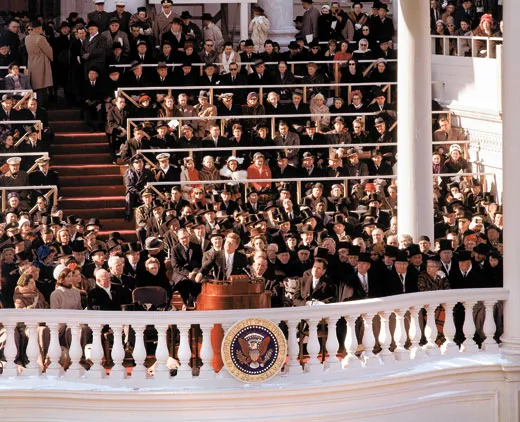
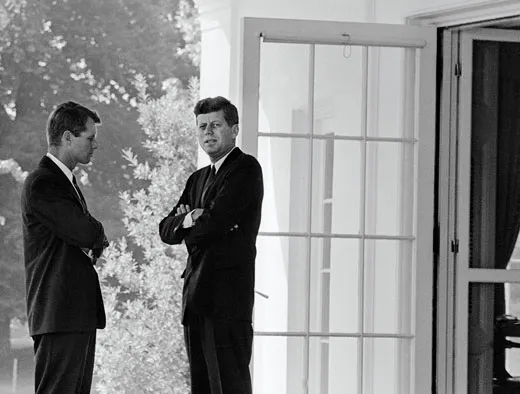
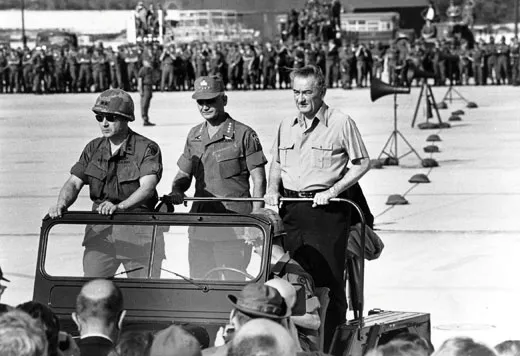
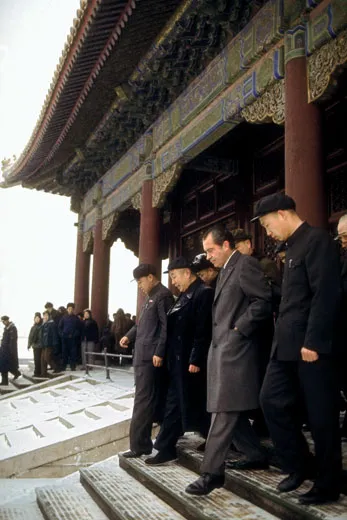
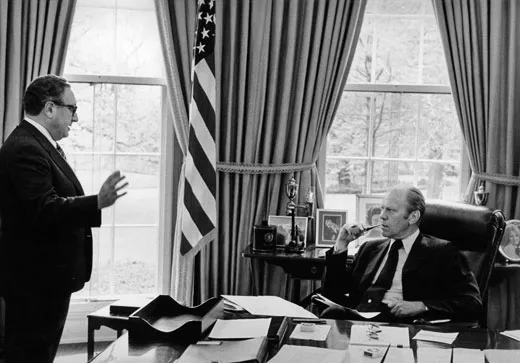
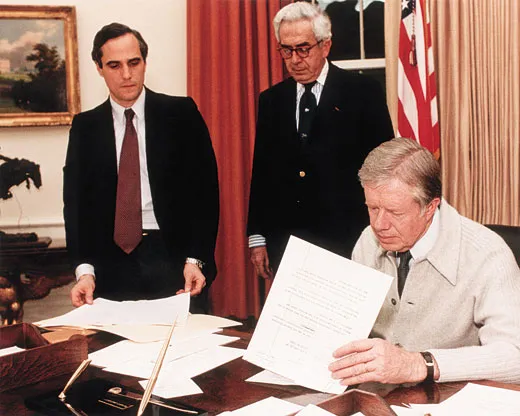
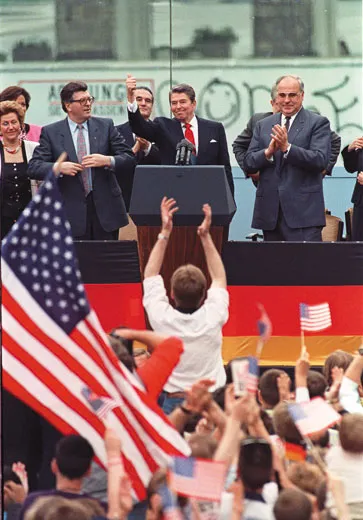
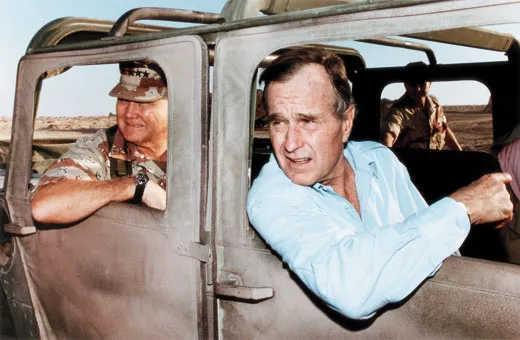

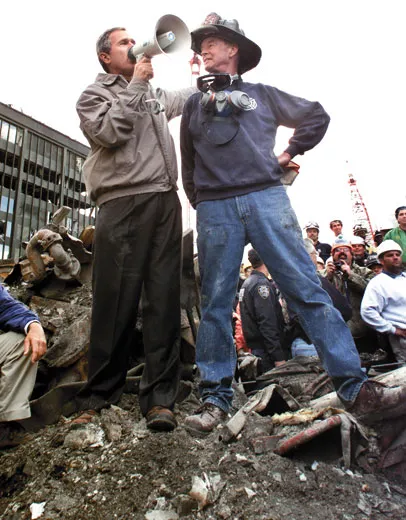
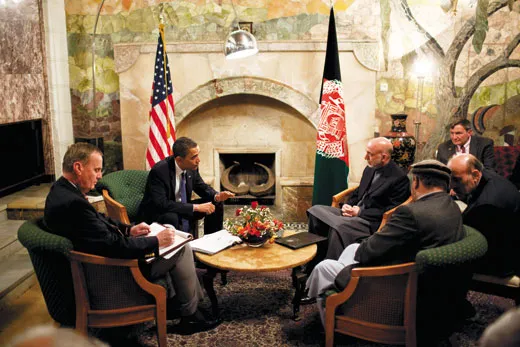

0 Response to "how has presidential power changed over time"
Post a Comment